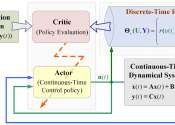Two-system model combines desalination and energy storage
Cornell engineers have refined a model that not only cultivates green energy, but also desalinates ocean water for large, drought-stricken coastal populations.
Dec 6, 2023
0
56
Engineering

Cornell engineers have refined a model that not only cultivates green energy, but also desalinates ocean water for large, drought-stricken coastal populations.
Dec 6, 2023
0
56
Engineering

A new study shows how a magnetic material can be used to help monitor the amount of life left in a rechargeable battery before it needs to be recharged.
Jun 14, 2022
0
11
Security

By completely rethinking the way that most Artificial Intelligence (AI) systems protect against attacks, researchers at EPFL's School of Engineering have developed a new training approach to ensure that machine learning models, ...
Sep 28, 2023
0
58
Computer Sciences

Memories can be as tricky to hold onto for machines as they can be for humans. To help understand why artificial agents develop holes in their own cognitive processes, electrical engineers at The Ohio State University have ...
Jul 20, 2023
0
116
Business

In a recent commentary article published in Nature, Chander Velu, Professor of Innovation and Economics at the Institute for Manufacturing (IfM) and Fathiro H. R. Putra, Lecturer in Industrial Engineering and Engineering ...
Oct 25, 2023
0
18
Engineering

Springs, squeegees and soda straws function with a common property—they are rigid in one direction and flexible in another. Structures like these, with properties that vary across dimensions, have played critical roles ...
Oct 31, 2022
0
54
Engineering

The soft whirring sound of low-frequency vibrations cannot be easily detected because it is not loud. But once detected, it can be hard to ignore. Often, residents complain of the annoyance caused by low-frequency vibrations ...
Sep 22, 2022
0
46
Software

Alexandre Bartel, Professor of Software Engineering and Security at Umeå University, in collaboration with several European researchers, has extensively analyzed weaknesses in software written in one of the world's most ...
Dec 27, 2023
0
2
Internet

Google is introducing Bard, its artificially intelligent chatbot, to other members of its digital family—including Gmail, Maps and YouTube—as it seeks ward off competitive threats posed by similar technology run by Open ...
Sep 19, 2023
0
61
Machine learning & AI

The concept of reward is central in reinforcement learning and is also widely used in the natural sciences, engineering, and social sciences. Organisms learn behavior by interacting with their environment and observing the ...
Jun 28, 2024
0
12
An engine is a mechanical device that produces some form of output from a given input. An engine whose purpose is to produce kinetic energy output from a fuel source is called a prime mover; alternatively, a motor is a device which produces kinetic energy from other forms of energy (such as electricity, a flow of hydraulic fluid or compressed air). A motor car (automobile) has a starter motor and motors to drive pumps (fuel, power steering, etc) – but the power plant that propels the car is called an engine. The term 'motor' was originally used to distinguish the new internal combustion engine -powered vehicles from earlier vehicles powered by a steam engine (as in steam roller and motor roller).
Military engines included siege engines, large catapults, trebuchets and battering rams.
This text uses material from Wikipedia, licensed under CC BY-SA